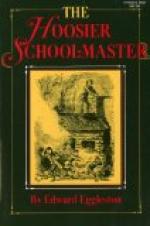And so, as a matter of policy, Ralph dragged his tired legs eight or ten miles, on hill and in hollow, after Bud, and Bill, and Bull, and the coon. But the raccoon[7] climbed a tree. The boys got into a quarrel about whose business it was to have brought the axe, and who was to blame that the tree could not be felled. Now, if there was anything Ralph’s muscles were good for, it was climbing. So, asking Bud to give him a start, he soon reached the limb above the one on which the raccoon was. Ralph did not know how ugly a customer a raccoon can be, and so got credit for more courage than he had. With much peril to his legs from the raccoon’s teeth, he succeeded in shaking the poor creature off among the yelping brutes and yelling boys. Ralph could not help sympathizing with the hunted animal, which sold its life as dearly as possible, giving the dogs many a scratch and bite. It seemed to him that he was like the raccoon, precipitated into the midst of a party of dogs who would rejoice in worrying his life out, as Bull and his crowd were destroying the poor raccoon. When Bull at last seized the raccoon and put an end to it, Ralph could not but admire the decided way in which he did it, calling to mind Bud’s comment, “Ef Bull once takes a holt, heaven and yarth[8] can’t make him let go.”
But as they walked home, Bud carrying the raccoon by the tail, Ralph felt that his hunt had not been in vain. He fancied that even red-eyed Bull, walking uncomfortably close to his heels, respected him more since he had climbed that tree.
“Purty peart kind of a master,” remarked the old man to Bud, after Ralph had gone to bed. “Guess you better be a little easy on him. Hey?”
But Bud deigned no reply. Perhaps because he knew that Ralph heard the conversation through the thin partition.
Ralph woke delighted to find it raining. He did not want to hunt or fish on Sunday, and this steady rain would enable him to make friends with Bud. I do not know how he got started, but after breakfast he began to tell stories. Out of all the books he had ever read he told story after story. And “old man Means,” and “old Miss Means,” and Bud Means, and Bill Means, and Sis Means listened with great eyes while he told of Sinbad’s adventures, of the Old Man of the Sea, of Robinson Crusoe, of Captain Gulliver’s experiences in Liliput, and of Baron Munchausen’s exploits.
Ralph had caught his fish. The hungry minds of these backwoods people were refreshed with the new life that came to their imaginations in these stories. For there was but one book in the Means library, and that, a well-thumbed copy of “Captain Riley’s Narrative,” had long since lost all freshness.
“I’ll be dog-on’d[9],” said Bill, emphatically, “ef I hadn’t ’ruther hear the master tell them whoppin’ yarns than to go to a circus the best day I ever seed!” Bill could pay no higher compliment.




